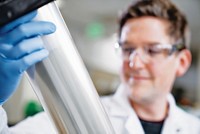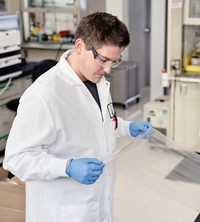Advertisement
Grab your lab coat. Let's get started
Welcome!
Welcome!
Create an account below to get 6 C&EN articles per month, receive newsletters and more - all free.
It seems this is your first time logging in online. Please enter the following information to continue.
As an ACS member you automatically get access to this site. All we need is few more details to create your reading experience.
Not you? Sign in with a different account.
Not you? Sign in with a different account.
ERROR 1
ERROR 1
ERROR 2
ERROR 2
ERROR 2
ERROR 2
ERROR 2
Password and Confirm password must match.
If you have an ACS member number, please enter it here so we can link this account to your membership. (optional)
ERROR 2
ACS values your privacy. By submitting your information, you are gaining access to C&EN and subscribing to our weekly newsletter. We use the information you provide to make your reading experience better, and we will never sell your data to third party members.
Mergers & Acquisitions
Ginkgo to acquire synbio competitor Zymergen
Synthetic biology firm will ditch Zymergen’s product-focused approach
by Matt Blois
July 26, 2022

The synthetic biology firm Ginkgo Bioworks is acquiring its competitor Zymergen in a deal worth about $300 million.
Both Zymergen and Ginkgo engineer microbes to act as tiny chemical plants, but they pursue different business models. Ginkgo works with customers to design a microbe, and the customers are responsible for marketing and selling the product the microbe makes. Zymergen hoped to develop and sell its own products.
Zymergen had a market capitalization of more than $4 billion in June of 2021, but investor confidence, and Zymergen’s valuation, fell sharply last summer when the company announced problems marketing its first product, a polymer film used in electronic displays. The misstep forced the company to cut back on staff and other expenses.
Ginkgo says it wants Zymergen’s staff, software, biological assets, data science tools, and especially its automated laboratory systems. The company hopes to sell or spin off Zymergen’s drug and materials businesses, signaling the end of the California-based firm’s product-focused approach.
“They did choose a very different business model at Zymergen,” Ginkgo CEO Jason Kelly said on a conference call. “But they’ve developed scalable and flexible technologies . . . We believe that will add tremendous value to our customers.”
Xiao Zhong, an analyst with the consulting firm Mach49, says the acquisition will shift Zymergen’s microbe engineering engine—the most valuable part of the company—into Ginkgo’s lower-risk business model. It was mainly marketing mistakes the hurt Zymergen’s valuation, he says, making the $300 million price tag for its underlying technology a bargain.
Zhong contends that large chemical companies with established marketing channels missed an opportunity by not scooping up Zymergen. For one of those firms, the deal would have created a new type of business capable of engineering chemical-producing microbes and selling the resulting products to customers, fulfilling Zymergen’s original vision. He suspects they thought the acquisition was too risky.
“The chemical industry, or adjacent industries that are actually using synthetic biology, tend to be very conservative,” he says.
Zhong says chemical firms might be more interested in acquiring synthetic biology companies as the industry matures and proves it can be successful. He’s optimistic that another company like Zymergen will emerge that can engineer its own microbes and market the products.




Join the conversation
Contact the reporter
Submit a Letter to the Editor for publication
Engage with us on Twitter